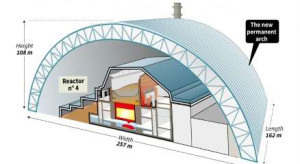Peter Lobner
Following the Chernobyl accident on 26 April 1986, a concrete and steel “sarcophagus” was built around the severely damaged Unit 4 as an emergency measure to halt the release of radioactive material into the atmosphere from that unit. For details on the design and construction of the sarcophagus, including many photos of the damage at Unit 4, visit the chernobylgallery.com website at the following link:
http://chernobylgallery.com/chernobyl-disaster/sarcophagus/
The completed sarcophagus is shown below, at left end of the 4-unit Chernobyl nuclear plant. In 1988, Soviet scientists announced that the sarcophagus would only last 20–30 years before requiring restorative maintenance work. They were a bit optimistic.
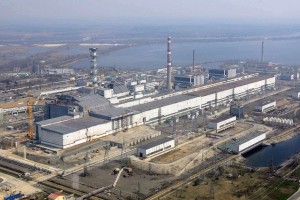 The completed sarcophagus at left end of the 4-unit Chernobyl nuclear plant. Source: chernobylgallery.com
The completed sarcophagus at left end of the 4-unit Chernobyl nuclear plant. Source: chernobylgallery.com
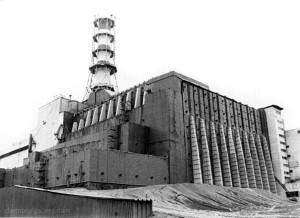 Close-up of the sarcophagus. Source: chernobylgallery.com
Close-up of the sarcophagus. Source: chernobylgallery.com
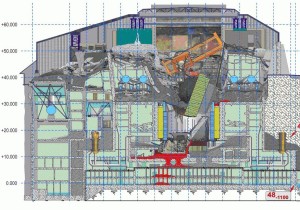 Cross-section of the sarcophagus. Source: chernobylgallery.com
Cross-section of the sarcophagus. Source: chernobylgallery.com
The sarcophagus rapidly deteriorated. In 2006, the “Designed Stabilization Steel Structure” was extended to better support a damaged roof that posed a significant risk if it collapsed. In 2010, it was found that water leaking through the sarcophagus roof was becoming radioactively contaminated as it seeped through the rubble of the damaged reactor plant and into the soil.
To provide a longer-term remedy for Chernobyl Unit 4, the European Bank of Reconstruction and Development (EBRD) funded the design and construction of the New Safe Confinement (NSC, or New Shelter) at a cost of about €1.5 billion ($1.61 billion) for the shelter itself. Total project cost is expected to be about €2.1 billion ($2.25 billion).
Construction by Novarka (a French construction consortium of VINCI Construction and Bouygues Construction) started in 2012. The arched NSC structure was built in two halves and joined together in 2015. The completed NSC is the largest moveable land-based structure ever built, with a span of 257 m (843 feet), a length of 162 m (531 feet), a height of 108 m (354 feet), and a total weight of 36,000 tonnes.
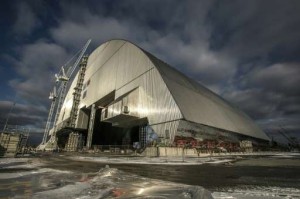 NSC exterior view. Source: EBRD
NSC exterior view. Source: EBRD
NSC cross-section. Adapted from phys.org/news
Novarka started moving the NSC arch structure into place on 14 November 2016 and completed the task more than a week later. The arched structure was moved into place using a system of 224 hydraulic jacks that pushed the arch 60 centimeters (2 feet) each stroke. On 29 November 2016, a ceremony at the site was attended by Ukrainian president, Petro Poroshenko, diplomats and site workers, to celebrate the successful final positioning of the NSC over Chernobyl Unit 4.
EBRD reported on this milestone:
“Thirty years after the nuclear disaster in Chernobyl, the radioactive remains of the power plant’s destroyed reactor 4 have been safely enclosed following one of the world’s most ambitious engineering projects.
Chernobyl’s giant New Safe Confinement (NSC) was moved over a distance of 327 meters (1,072 feet) from its assembly point to its final resting place, completely enclosing a previous makeshift shelter that was hastily assembled immediately after the 1986 accident.
The equipment in the New Safe Confinement will now be connected to the new technological building, which will serve as a control room for future operations inside the arch. The New Safe Confinement will be sealed off from the environment hermetically. Finally, after intensive testing of all equipment and commissioning, handover of the New Safe Confinement to the Chernobyl Nuclear Power Plant administration is expected in November 2017.”
You can see EBRD’s short video of this milestone, “Unique engineering feat concluded as Chernobyl arch reaches resting place,” at the following link
https://www.youtube.com/watch?v=dH1bv9fAxiY
The NSC has an expected lifespan of at least 100 years.
The NSC is fitted with an overhead crane to allow for the future dismantling of the existing sarcophagus and the remains of Chernobyl Unit 4.
